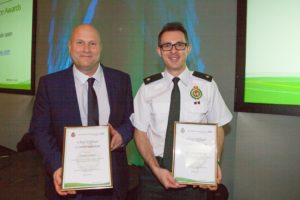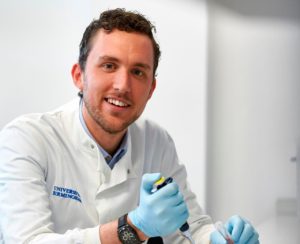Ground-breaking work being undertaken here in Birmingham has been highlighted by the team at the NIHR Surgical Reconstruction and Microbiology Research Centre (SRMRC).
The SRMRC, a trauma research centre, welcomed delegates from all over the country for its day-long showcase event at the Institute for Translational Medicine at Queen Elizabeth Hospital Birmingham (QEHB). Visitors came from a variety of organisations including the Ministry of Defence and the National Institute for Health Research. Professor Tony Belli, Consultant Neurosurgeon, Professor of Trauma Neurosurgery and Director of the trauma research centre, opened the event by updating the packed lecture theatre on the progress of the centre and the way it is heading, taking a more translational approach to research.
Research projects looking at the body’s reaction to traumatic brain injury, the effect on the gut when the body suffers from trauma and how to use technology to help patients communicate when they cannot speak were just a few of the forward-thinking studies covered throughout the day.
Professor Belli said: “I was really pleased with how the day went. The showcase was extremely well attended, which exemplifies the interest in trauma research. Here at the SRMRC we have been and are doing some incredible work and have a very talented team that works tirelessly to advance these studies so they can begin helping trauma patients as soon as possible.
“We are now in a key phase in the SRMRC timeline. For the past few years we have been working to lay the groundwork for these ambitious studies and now we are in a position to move forward and take a more translational approach as we move from research to translating it into new medical techniques, drugs, technologies and more that can begin to help the people we are ultimately doing this for, trauma patients.”
The NIHR SRMRC is a national trauma research centre, transferring innovation used in the treatment of injured military personnel to improve outcomes for all patients. It brings together the pioneering advances in surgery and infection control made by military and civilian scientists and medics working together.
Based at the QEHB, the centre harnesses expertise from the Ministry of Defence, University of Birmingham and QEHB.





